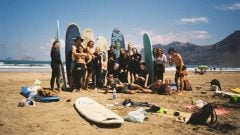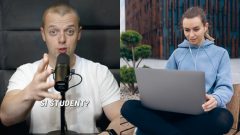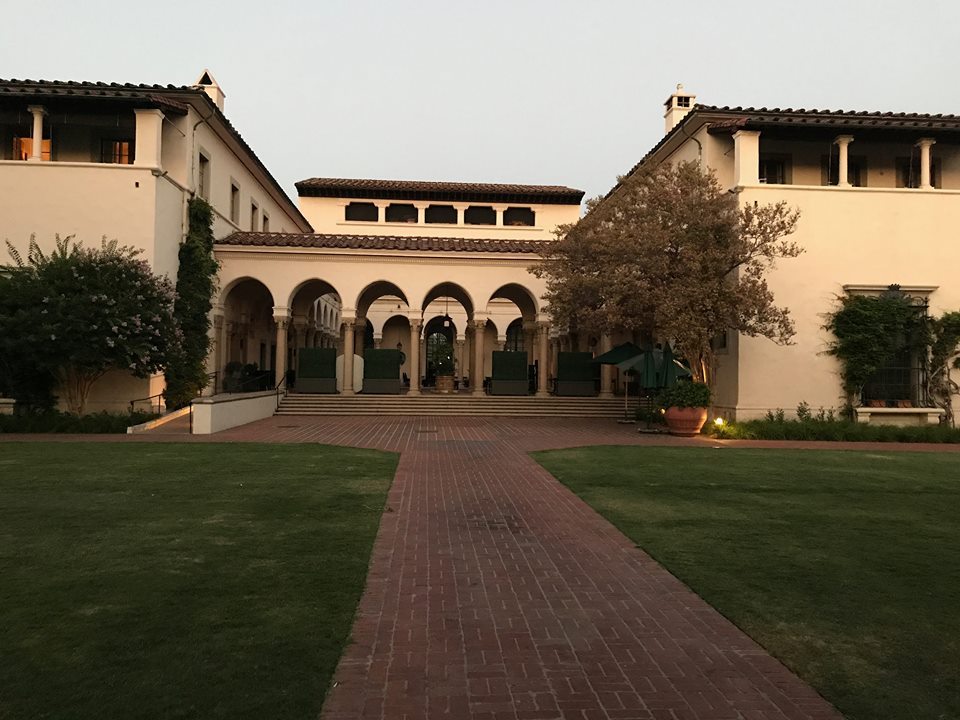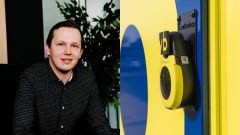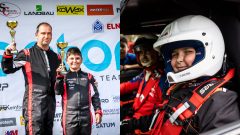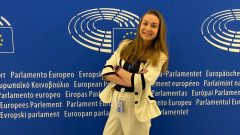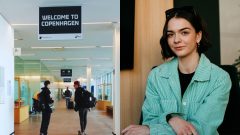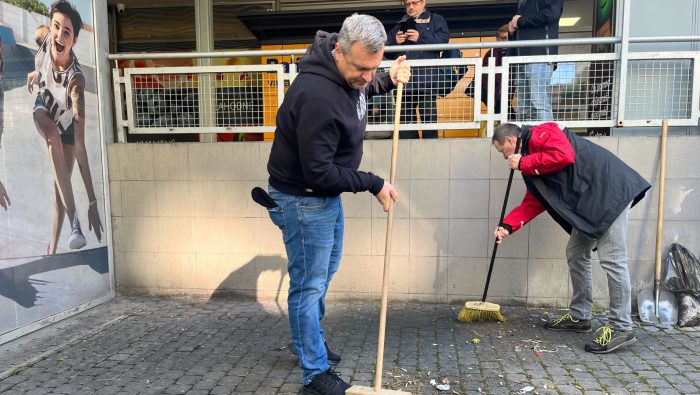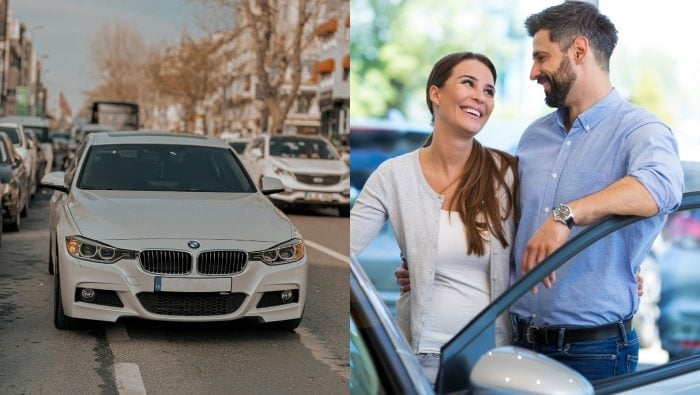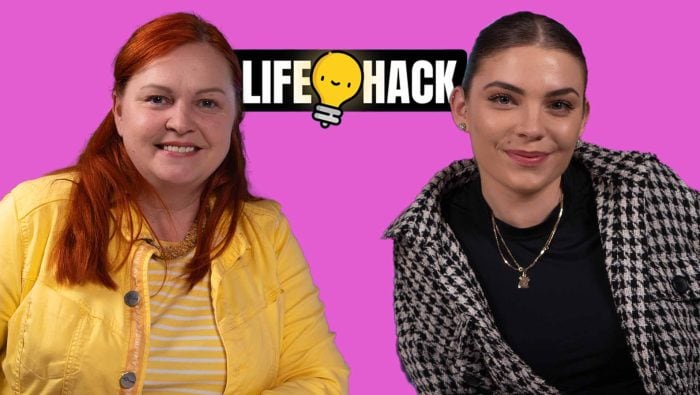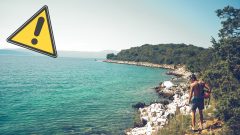
[EN] Miroslav Gasparek, Imperial College London: My aim is to create a biotechnology company – and ideally, in Slovakia
- Miro (22) studies Biomedical Engineering at the Imperial College London
- During the first year of his studies, his classmates elected him to be a Year Representative and this year as a Departmental Representative
- Miro works on his own projects
- Within the student organization Unimak, he also voluntarily helps Slovak and Czech students with the admissions processes to the elite universities abroad
- He took part in the research internships at Imperial College London and the California Institute of Technology in California
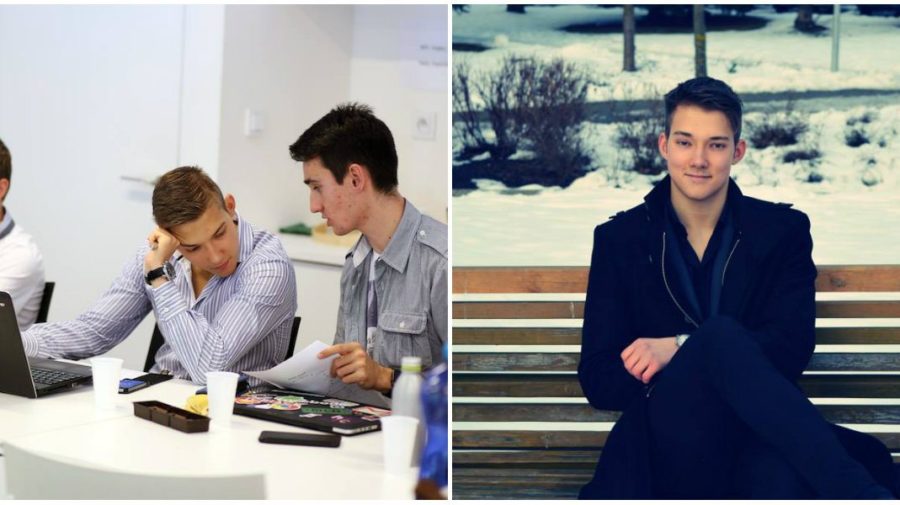
- Miro (22) studies Biomedical Engineering at the Imperial College London
- During the first year of his studies, his classmates elected him to be a Year Representative and this year as a Departmental Representative
- Miro works on his own projects
- Within the student organization Unimak, he also voluntarily helps Slovak and Czech students with the admissions processes to the elite universities abroad
- He took part in the research internships at Imperial College London and the California Institute of Technology in California
Hi Miro, why did you decide to study in London?
The Imperial College is one of the best engineering universities in the World. It is ranked as the best university in the field of engineering in the Europe according to some universities rankings. I had positive references on Imperial, as a couple of my friends had already been studying there. During my high school years, I attended various Olympiads, such as International Olympiad on Astronomy and Astrophysics and International Physics Olympiad. I met many people who were about to commence their studies at Harvard, Oxford, Cambridge, or Imperial. This gave me the courage and I decided to try it too. However, I was not aware of the world-class level of the Biomedical Engineering at the Imperial College. The studies are intensive here.
Intensive in what sense?
In order to do well in the Department of Bioengineering at Imperial, one must devote a significant amount of his time to his studies. I still remember the first week of my first year, when we were told that the first year of studies at the Imperial College is just like the fourth year in the other department of the bioengineering.
Does that mean that you should already have significant preliminary knowledge before coming to the university?
A student must have a strong background in the mathematics and physics. And, most importantly, it is expected that the student is creative and thoughtful. Because the whole engineering is about the searching for open problems.
… And you are searching for the solutions to these problems, right?
Yes, and this is what really fascinates me. Keeping a patient alive in his bed with the support of many machines is good. But if we can provide the patient with a small cardiac stimulator that will enable him to execute the normal, daily-life tasks is much better. Such person immediately experiences a better quality of life.
As far as I know, there is a course of Bioengineering at the Slovak Technological University in Bratislava. Are you interested in the situation in Slovakia as well?
I would say that I am. I think that there is something similar in Kosice, in the eastern part of Slovakia too. One of the fields that bioengineering focuses on is Medical Physics and the construction of the medical devices. I also know that there is biochemistry at the other faculties.
I would guess that the whole concept of the studies is completely different from the one in the Slovak universities.
I can describe this by an example. I have some friends studying Physics at the Imperial College. I believe that the mathematics course at the Faculty of Mathematics and Physics at the Comenius University in Bratislava is much deeper than the one at Imperial. But some fields of the Mathematics might not be that useful for a physics student, even though, of course, the mathematics is essential for the understanding of the physics concepts. However, I do not think that it is necessary to study advanced set theory in the first year of the studies, especially for the engineers. While it can be truly useful, it might not be that applicable during student’s first steps. I believe that more time should be devoted to the independent thinking and the application of the knowledge in the real-world situations.
Did they teach you to think “out of the box” in the United Kingdom? Do I understand it correctly?
On the very first day, they took us to the electrical laboratory, and the member of staff with long-lasting experiences from the industry, who is responsible for the labs, told us that the space was opened until 7pm. And then he said that if we wished to work longer, we can work in his smaller lab upstairs, where you can be until the College closes, which is at midnight.
We were playing with the circuits in the first year. We had to measure everything by ourselves. If we struggled with some tasks, our teachers came to us and discussed the problem. From the very beginning they told us that we must record all the measurements in our log books. “Do not erase the wrong ones – just cross them out. What if you will get back to them in a couple of years and you will find out that they were actually correct?” Britons are precise and they give attention to detail.
In the second term of the first year, we were instructed to do something more practical. We were asked to design the circuit in the computer program and to build it in the lab afterwards. All of us had to build an electronic stethoscope – you can just put the sensor on your heart and you can hear your heart sounds.
What subjects do you study in bioengineering course?
I think that it is the broadest subject at the Imperial College, as it combines subjects studied by electrical engineers, mechanical engineers, or even biochemists. But we do not study only the theory of the mechanics, even mathematicians at Imperial do that
In the year two, we received fancy broiler suits (with a coat of arms!) and they taught us basics of drilling, milling and turning, so that we can not only theoretically design a joint implant, but also to know how such thing is manufactured – what can realistically be made, and what cannot. Furthermore, we study Modelling in Biology, Programming, Medical Science, physiology, wet labs, and even engineering ethics.
Do they teach you this so that in the future you can know what can be created, in order to minimize the problems in the next step?
Yes, you got it exactly right. Amazing characteristics of the bioengineering course is that we study everything from rock-hard mathematics, through physics, fluid mechanics, to electromagnetics.
Bioengineers are not the best in a certain are from the start. But we can take a team composed from a mechanical engineer, electrical engineer, medical physicist, and a doctor – and we can talk with each of them, integrate the efforts, and to propose a solution to the problem.
Have you worked on any interesting project in the school?
In the second year, we work on the Sports Innovation Challenge. We work in the groups of seven to nine students, and we usually develop tools for the paralympic athletes or the people with mental or physical disabilities. Last year, we took a commercially available headset that can measure the electromagnetic waves of the human brain. And we modified it so that when the user focuses, he can play with a small Scalextric car.
How many bioengineering students are in a single cohort?
It is truly interesting. For instance, the Department of Electrical and Electronic Engineering at Imperial has significant majority of boys, as well as the other Departments within the Faculty of Engineering. However, in our Department, it is different – we are essentially divided exactly into two halves – I think that it makes 53 boys and 53 girls, coming from 33 countries, I think. But I am the only Slovak in the history of the Department that ever studied there – unfortunately. I would be glad if some fellow Slovak student would join me.
Are you satisfied with the approach of the academics to students?
It works well. Teachers do not drink coffee, hidden in their offices during the break between the lectures – they spend time with students and discuss their questions with them. Also, they are keen to hear the feedback from students and their representatives. The student voice really matters here. Through our comments, we improve the teaching process and the teaching techniques.
In the first and second year of my studies, my classmates elected me to be a Year Representative, who communicates with the Departmental administration. And last year, I was elected to be a Departmental Representative, a student, who represents all the undergraduate and taught postgraduate students at both Departmental and Faculty level. It is a great responsibility.
You seem to be truly fascinated by the bioengineering. Have you thought about your own project?
I am trying to be active in school. It is normal, if student comes to the professor and tells him “wow, it was a great lecture” or, alternatively – “more than half of the people did not really understand your explanations”, of course, in a polite manner.
I have begun to work on some research in the systems biology as early as in year one. I started to read a textbook for third and fourth year students, and one day, I went for a consultation with a faculty member. I asked her if she could give me some project. So I presented the use of a dynamical systems method in medicine. Later, I started to work on eczema – specifically on the mathematical modelling of its treatment. After that, I became more interested in the synthetic biology than in systems biology.
At Caltech, in California, they do have summer research programs, where a student must write up a research proposal, then first and the second report, and finally make a poster or a presentation to the research group.
The students focusing on research in different fields are networking together. The summer programs at Imperial are not yet working in such a structured manner – but I believe that they could. Also, it is necessary to note that they have been doing summer research programs for more than 35 years at Caltech.
Can you actually influence that?
Imperial is really open to suggestions like these. The usual response of the staff members is not “Why would we change it, we have done it like this for years”. It is more likely that they will say that your idea is interesting and that we can look into the meaningful solutions.
You work on your own projects, you study a difficult course at the university and volunteer for the Unimak… How do you manage your time so that you can participate in all those activities?
Well, to be honest, I must admit that my time management is not stellar. One of my time-proven strategies is to pick up as many activities as possible… and then say to myself “OK, you have decided to do all these things – so you must cope with that, no matter what.”
And I do believe that one can really improve the mental and physical performance by optimization of his lifestyle and through healthy habits. I wake up at around 5.00am. By 6.00am I drink a coffee, read emails and get myself ready for the day. Then I lift weights in the gym that we have at our boarding hall. I aim to arrive at school at about 9.00am. I usually stay in the school until 6.00pm. If I do not have a lecture, I either study or schedule a meeting for this time. On my way home, I take a nice walk through the Hyde park or the Kensington gardens, while making phone calls or listening to the interesting podcasts, such as Andreessen Horowitz. While I am travelling in the tub, I do read textbooks or World’s news.
I simply aim to effectively use all the spare time I have. When I return from the Imperial, I finally eat – I cook every day – and then I work for two more hours. When you are passionate about what you are doing, it is doable. Although this lifestyle is sometimes rather exhausting, I still believe that it is meaningful. If you were given talents and gifts, you should use it appropriately, and eventually multiply it, in order to have positive impact.
Andreessen Horowitz? What kind of podcast is that?
Marc Andreessen and Ben Horowitz are two VCs in the United States. They manage one of the best VC funds – these guys invested into famous tech start-ups, such as Facebook, Twitter, or Slack. These are the real businessmen, with real industrial experience. If you want to learn more about the current trends in the tech world, I would recommend you listen to this podcast. They have many interesting guests from academia, politics, or tech industry.
How about your tuition fees?
The annual tuition fees in the UK is more than 9 000 GBP. It does not include living costs – it is just pure tuition. I could not afford this, so I have a student loan from the state-owned Students Loans Company. I just need to confirm every year during my undergraduate studies that I request the loan. I send my loan application to the Students Loans Company that processes the data. I will also get information about the current height of my debt.
When do you start re-paying the loan?
The advantage is that I do not start repaying the loan until my income exceeds certain limit. In the UK, it is currently 1 750 GBP. If I would work in Slovakia, the limit would be lower. The loan is being re-paid in the form of a small percentage from my salary. And, interestingly, if I would not pay the loan back within 30 years, the rest of the debt will be scrapped off. But, in general, most people attempt to pay the loan back.
I would assume that the student, who is admitted to such university is aware of his responsibility and repays the loan back.
Exactly. The character of the person is always important.
You went back to Slovakia just before Christmas and I know that you participated in the “I live science” conference. What do you think about it?
It was a scientific conference of the Slovak Academy of Sciences. “I live science” is an initiative of the Slovak scientists working abroad. I was surprised by certain things. For instance, from what I heard, the collaboration between the academia and the private sector is not very good in Slovakia. Also, the engagement of the undergraduate students in the research is still very unusual. We are still in the early stages of development. I think that the situation in the healthcare is similar. I am afraid that the state will not provide the solution to the challenges of the modern healthcare and that we will need more of the private investments in this sector.
For example, at the Imperial, we have the Technology Transfer Office that deals with the transfer of the results of the research realized by academics into the industry and with its monetization. As a student, I am eligible for the intellectual property protection of the results of my work, as I pay the school fees. The employees of Imperial have it a bit different – I think that 50% of the revenue goes to Imperial Innovations – but in exchange for that, Imperial Innovations will help to commercialize the product.
And I think that similar process should be established in the Slovak universities. However, the problem is that even if we have good equipment, we lack the qualified people. Just an example – we cannot teach a graduate of the Biochemistry course to use a pipette. These are the basics that the student should have already mastered.
We are getting closer to the topic of the healthcare. What kind of changes would you do to the current system?
The modern medicine is rapidly advancing. We are getting into such phase of development that in the Britain, more people are annually dying because of dementia and Alzheimer’s disease than due to cardiovascular diseases. The diseases that challenge us in these days are diabetes, cancer, or neurodegenerative diseases in general.
Let’s take the example of diabetes. We cannot heal the patients completely – we can only do the long-term management of this disease. But the treatment of a diabetic patient that lasts 20 years is very expensive. Especially considering that the type 2 diabetes is a lifestyle disease (type 1 diabetes is a genetic disease) – many people suffer from it because of their lifestyle, as they eat a lot of sugar, drink alcohol and smoke. Injecting insulin for 20 years is very costly. For instance, the British model of the healthcare is based on the universally available healthcare, which is pretty much free of charge. However, this model seems to be unsustainable and the waiting times can be very extreme, unless you are in a life-threatening condition.
In general, I do believe that people should take responsibility for their own health. Let’s say that someone smokes a pack of cigarettes per day. His risk of the lung cancer is therefore much higher than the average. If he is diagnosed with lung cancer, the treatment costs can reach several thousands of GBP, whether the patient survives or not. Why should an insurer pay the full costs of the treatment to such patient, if the funds can be directed towards, say, a kid with a rare genetic disease that he or she is not responsible for? Especially in the light of those sad stories that we hear in the Slovakia, stories about the people with disabilities that cannot even receive money for some necessary piece of equipment.
Also, bringing the new drugs to the market is more and more expensive. We know about the Moore’s law in the field of computing, which states that the price per chip is exponentially decreasing. Well, the price of introduction of a new drug to the market exponentially grows, according to the “Eroom’s law” (reverse of Moore’s law). Bringing a new medicine to the market can cost as much as two billions of dollars. Then it might not be rentable to the pharmaceutical companies to do research of some rare disease. And the patients? They just have a bad luck.
I think that if people do not take the responsibility for their health, the healthcare system will not be sustainable. It can get pretty nasty. And we can see this in Slovakia. Slovak men have the greatest incidence of the colorectal cancer in the world.
Should we then rather invest into prevention than the treatment of a disease?
Exactly. The greatest gift ever given to the humanity is freedom. But the true freedom is not only the ability to do what we like, but also in the ability to be accountable for it. We should reward the positive lifestyle changes, and we should penalize the unhealthy choices. Also, we should move towards the personalized diagnostics and genetic testing. Today, we can test many things – food intolerances, genetic factors leading to various diseases, or the natural hormonal levels. I once talked with an expert on the healthcare and he told me that in his opinion, we would move towards genetic profiling of the insured customer and the subsequent optimization of his insurance plan, accounting for his unique traits.
The medicine moves towards the personalization. Yet, we have just started creating clinical standards in Slovakia.
What are the clinical standards?
The clinical standards are standards of care that physician uses during the treatment of an illness. They represent the individual steps that should be taken if certain diagnosis occurs. It works for majority of people, although some patients still require an individual approach. But in the western countries, this has been established years ago. Nobody asks physicians to read textbooks and articles in the Journal of Clinical Immunology for 10 hours per day. That’s why the standardized approaches are used. Of course, you can deviate, if you have a good reason for it. We are still just moving towards this concept.
Basically, the individualization is the future of the medicine. Each of us has our own unique genetic code. There are people who get sick even though they eat healthy whole of their lives. And then you have people who drink alcohol, smoke and yet still live until their nineties.
Let’s get back to school. How did you get the internship at Caltech?
I was captivated by the mathematical aspects of the biology and medicine. I was fascinated by the fact that something like the eczema progression can be captured by the mathematical equations. Finally, I got interested in the synthetic biology. And I thought that it would be great to do an internship in the United States, to get more international experiences. On the advice of my professor, I started to read a textbook Biomolecular Feedback Systems by professor Domitilla del Vecchio from MIT and professor Richard M. Murray from Caltech.
After one lesson of the control systems, I asked my supervisor (Dr. Reiko Tanaka, to whom I am very thankful) if she thinks that I could do an internship abroad, subject to acquiring the private funding. She agreed. First, I wanted to do an internship with Prof. del Vecchio, but she was just leaving on the parental leave. Then I tried to ask another professor – and I am glad that I ended up with Professor Murray.
Who is Richard Murray?
Richard focused on the autonomous control, which can be used in systems, such as self-driving cars. He was the head of the whole division of engineering at Caltech. Later, he started to focus on the synthetic biology. He is one of the world’s leading experts in these fields. What is interesting, is that in 2016, he was named to the US Department of Defense Innovation Advisory Board, which also includes Eric Schmidt of Alphabet and Jeff Bezos of Amazon.
The reason why I am fascinated by the control systems, is that they are quite universal – you can use very similar mathematical methods to describe the flight of a rocket and the regulation processes in the human cells.
Richard sent me an article about genetically-programmed artificial cellular machines, aka synthetic cells. I studied the article and I developed a research proposal, in which I described my research intentions. I wanted to model the interconnection of the biomolecular subsystems in the artificial cells. Then I sent the proposal to Richard.
What feedback did you get from him?
He said that it is very good. It was just after the exams. I thought that I would die out of happiness – right after I would die of tiredness. And he accepted me! 😊
I continued to work on the Introduction, Objectives, Methods, and my planes for each week. Then I went through administrative procedures. I needed four references, including one from the Head of Department. But the effort paid off. I was given an opportunity to work in the lab, although I thought that I would only work on mathematical and computational simulations. I learned the basics of the work with biomolecular circuits, gene expression, and the evaluation of the measurements.
Can you share any interesting experience from California that you had out of lab?
I used to go to the Gold’s Gym fitness centre. It as an old gym, which hosts both young trainees and the experienced athletes. I even met a gentleman who was regularly going to the gym with… The Bible! And, overall, I met many interesting people there – for instance, a former vice-president of the Bank of America. It was an exceptionally interesting gentleman that travelled about 50 countries and studied in one of the best business schools in the world. I am grateful for having the opportunity to have a lunch with him, and especially for a very interesting and inspiring discussion. It was a truly remarkable gentleman!
Another interesting, yet painful experience was a shin bone fracture. One day I went for a run, stepped wrongly, and I broke my leg. It was a stress fracture, my tibial bone literally cracked. I thought that it was just pulled muscle or something like this. I also consulted this with a friend of mine, who is very skilled physiotherapist. He said that it simply cannot be a stress fracture – not from running.
So I was walking for next ten days approximately 10 km a day – on a broken leg. As the leg still hurt, I finally went to doctor. In the hospital, they did all the required tests, and the RTG sample showed that I have a leg fracture. Nobody could believe that it is possible, as I neither fell on the ground, nor I hurt myself. I remember the surprise of my lecturer of the biomechanics when I told him this story. Fortunately, the Slovak insurance covered all the expenses. Consequently, I can say that I have very good experiences with the American healthcare.
And the last question – what would you like to do after your studies? Would you like to return to Slovakia?
Currently, I am third year undergraduate student and I am going to finish my Master degree next year – it takes only four years in the UK. I would like to pursue PhD afterwards. My long-term objective is to build an interesting biotechnological company, make use of my experiences and assemble a team of brilliant people – ideally, back home in Slovakia. Because of volunteering in the Unimak, where we help Slovak students with admissions processes to the elite universities free of charge, I have had opportunity to meet many incredibly skilful Slovak high school students.
So my dream is to invent something interesting in the field of bioengineering and to develop it back home, in Slovakia, so that I can attract other science and tech oriented Slovaks back home. When we hear about Elon Musk, SpaceX and the design of the rockets, about Tesla and electric cars – it is just awesome. Well, and my dream is – if I will have the strength and abilities – to build something similar in the field of biotech.
The article was translated from Slovak language.
